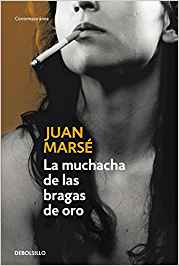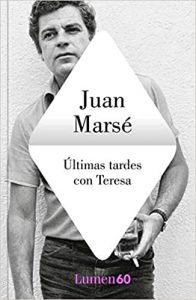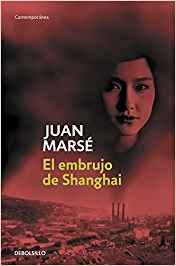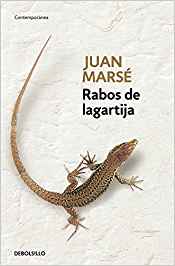Beyond one of his last books of a more intimate nature as it was private collection, the bibliography of Juan Marse It spans from the 60s until his death in 2020 in a diversity of works with the unmistakable Marsé stamp that overflow fictionalized existentialism, countless times focused on post-war Spanish society.
Multitude of stories that flock between the best and the worst of the souls exposed to misery. Novels that provide knowledge and perspective on the individual in a decaying social environment, marked by defeat and indoctrination.
To read Marsé is to discover a kind of literary brilliance amid devastated settings by moral misery, implying a commitment and a necessary critical position on power and social stratification.
To rescue the three best novels of Juan Marsé you have to think very hard. Between that magical plot uniformity, each novel ends up being a jewel of his literary work as a whole. However, as always, I'm going to get wet.
3 recommended novels by Juan Marsé
Girl with the Golden Panties
Luys Forest, an old Falangist writer, widowed and with a literary prestige already reduced to almost nothing, dedicates himself to writing his memoirs, in which he incessantly retouches his past to convert vulgar, unpleasant or uncomfortable facts into what seems more romantic, poetic to him. u appropriate in the current situation; At his side, his niece Mariana (the girl with the golden panties, who gives the novel an ironic Balzac title) harasses him like a torn and cynical voice that combats the writer's lying fabulations.
But in this game of selflessly remaking the truth of his past, there will be a cascade of surprises that will provide an unexpected ending to the book. The story, which begins as a political satire, contrasting Forest's "rhetorical junk" with Mariana's corrosive frankness, gradually penetrates deeper and deeper areas that add an unusual dimension to the novel.
The satire ends in an ambiguous and mysterious ghost story, between Borges and Henry James, which makes this work by Marsé the most ambitious of all his. Starting from a series of situations and characteristic characters in his production. "The Girl in the Golden Panties" goes much further, enriching her perspective and giving us the most complete and mature of his books.
Latest afternoons with Teresa
Great things have their beginnings and their ends marked. The last afternoons with Teresa sound like learning and late in the day amid dim lights that invite maturity like a shadow of what life was ...
Throughout these pages we witness the birth of one of the most powerful and enduring literary geographies of our time, that post-war Barcelona written in the quiet backlight of memory. And we also meet two characters whose long and happy coexistence with several generations of readers has turned them into myths, into ideal incarnations of their time: Teresa, a rebellious and leftist university student, daughter of the Catalan bourgeoisie, and a Murcian immigrant, a attractive boy known as "Pijoaparte", they live a love story that reflects all the contradictions of an era, the splendor and misery of the social classes, the naivety of easy commitment and the bitterness and resentment of the losers, inhabitants of an internal exile in which, forged in so many defeats, they still dream like children.
Shanghai package
In the Barcelona of 1984, Captain Blay, with his head bandaged and his suspicions about the gas leaks that are about to blow up the entire city, walks through the neighborhood still shaken by the death throes of the lost war and accompanied by the wailing specters of her dead children.
Little Daniel escorts him through those posthumous streets, where he will meet the Chacón brothers, who guard the entrance gate of the house where Susana, a girl with lung disease, daughter of Mrs. Anita, is convalescing. and weathered movie box office, and Kim, a revolutionary, fled the country and clouded by the mythical glow of poachers.
Kim's friend and traveling companion, Forcat, will soon arrive at the house, who will narrate to the children the risky adventure that the girl's father undertook in Shanghai, faced with bloodthirsty Nazis, merciless gunmen and fatal women who come his way. in the most sordid cabarets of the forbidden city.
Other interesting books by Juan Marsé
Lizard tails
Sometimes I think that more recent works than this perhaps should achieve the honor of being on the podium, but the national prize for narrative that adorns this novel with its brilliant cord always reminds me of those emblematic characters that occupy its pages, without a doubt one of the most fertile microcosms of current Spanish literature.
The unforgettable characters in this novel, such as the endearing and heartrending couple formed by the adolescent David and his dog Chispa, the enamored Inspector Galván or Rosa Bartra, the beautiful pregnant redhead, are due to a very specific sadness and historical scam, but also to the eternal scam of dreams, embodied here by the ghostly appearances of a fugitive libertarian father and an elegant RAF pilot who, from an old magazine photograph hanging on the wall, acts as a confidant of the fanciful David.
With these characters, with a translucent language that contrasts with the deep emotional and moral charge that runs below the plot, Lizard tails, endowed with a narrative structure as wise as it is imaginative and showing how fragile and ambiguous the limits are between reality and fiction, truth and lies, good and evil, love and heartbreak, corroborates the condition of Juan Marsé as one of the greatest novelists, not only of Hispanic letters, but of current European narratives.
And since I have committed to opting for three works by each author I review here, I will randomly assign honorable mentions, when appropriate, to those works that cannot be uploaded, but that could ex aequo be positioned in that honorific box.
In this case, I will quote That distinguished whore, where I think Juan Marsé pointed to a certain autobiographical aspect and in whose plot he combined postwar and transition through the resolution of a murder that was, like the freedoms of Spain, hidden for many years.




